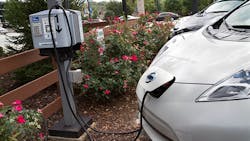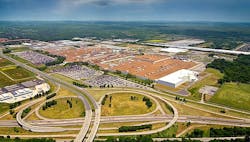Nissan Dismisses Rumors It Will Reduce Electric Car Battery Production in US
WASHINGTON - Japanese automaker Nissan (IW 1000/39) is dismissing speculation that it intends to scale back electric car battery production at its U.S. plant in Tennessee.
Nissan's ambitious electric vehicle program has been a signature initiative of Carlos Ghosn, the chief executive at both Renault and Nissan.
"The Renault-Nissan Alliance remains 100 percent committed to its industry-leading EV program," spokesman Travis Parman said in a statement.
"This global commitment continues for the foreseeable future, and we have not taken any decision whatsoever to modify battery sourcing allocation."
Parman said Nissan has no plans to "impair" its battery investments in the United States or Britain.
His comments came after media reports suggested that the Renault-Nissan alliance was re-evaluating its battery strategy.
The proposal reportedly under consideration includes curtailing production at Nissan-operated battery plants in England and the United States in order to instead purchase electric vehicle batteries from the Korean company LG Chem (IW 1000/229).
The speculation about Nissan's cutbacks circulated as Tesla (IW 500/384), the electric vehicle maker based in Palo Alto, outside San Francisco, joins with Panasonic (IW 1000/41) to build a new $5 billion battery factory in Nevada set to build 500,000 batteries a year by 2020.
Tesla currently sells about 1,500 vehicles per month but has new smaller, less expensive models on the drawing board, according to the company's founder billionaire Elon Musk.
Parman noted the Nissan Leaf is the best-selling electric vehicle in the U.S., having set records for 18 consecutive months. Leaf sales are up 34% through August. In addition, electric-powered Leaf sales have topped 3,000 units in three of the last four months, Parman said.
Nissan Leaf: 'No Charge to Charge'
Nissan is promoting the Leaf through a "No Charge to Charge" incentive offering two years of no-cost charging to new Leaf buyers, in 11 key markets around the U.S. such as Los Angeles, San Francisco and Seattle.
Nissan has helped install more than 650 quick chargers in markets across the U.S., and Nissan is working with partners on 500 additional chargers over the next year, Parman said.
Nissan has also announced plans for introducing for a battery electric cargo van in the U.S.
The Nissan battery plant in Smyrna opened in the spring of 2013 and is the largest Li-ion automotive battery plant North America and the only plant controlled by a carmaker.
The heavily automated plant covers 475,000-square feet and is capable of making as many as 200,000 batteries annually.
The battery plant sits next to the Nissan assembly plant, which was retooled in 2012 to accommodate Leaf production. The Leaf is manufactured on the same line as the Altima and Maxima so volume can readily be adjusted among the vehicles to meet demand.
Without major technological innovation, new legislation or tax incentives, batteries still fall short."— Art Wheaton, automotive industry expert at Cornell University
But electric vehicle sales continue to struggle.
"There are many different options for consumers to choose from to power their cars. Electricity and pure battery cars have some advantages but also major hurdles to win over consumers," noted Art Wheaton, automotive industry expert at Cornell University.
"It is also very difficult to change the mindset of drivers after more than 115 years of gasoline dominance. Without major technological innovation, new legislation or tax incentives, batteries still fall short."
In addition, gas prices have decreased or stabilized in many areas.
Even though Tesla's new factory may help electrical battery development, the technology remains overall "too heavy, too costly, and rely on Lithium, which is not as readily available as gasoline," Wheaton said.
Copyright Agence France-Presse, 2014
About the Author
Agence France-Presse
Copyright Agence France-Presse, 2002-2025. AFP text, photos, graphics and logos shall not be reproduced, published, broadcast, rewritten for broadcast or publication or redistributed directly or indirectly in any medium. AFP shall not be held liable for any delays, inaccuracies, errors or omissions in any AFP content, or for any actions taken in consequence.

